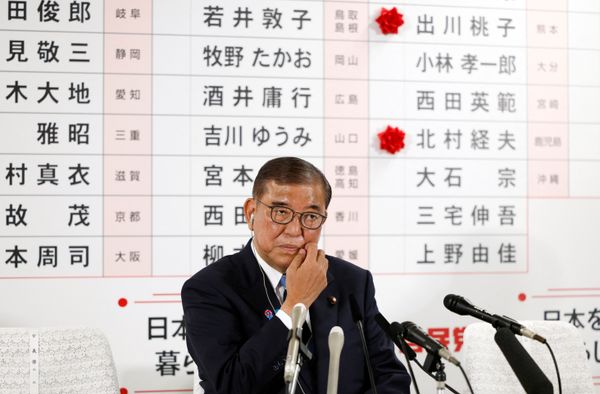TOKYO, July 21 — Japan's ruling coalition is certain to lose control of the upper house in yesterday's election, public broadcaster NHK reported, an outcome that further weakens Prime Minister Shigeru Ishiba's grip on power as a tariff deadline with the United States looms.
While the ballot does not directly determine whether Ishiba's administration will fall, it heaps political pressure on the embattled leader who also lost control of the more powerful lower house in October.
Ishiba's Liberal Democratic Party (LDP) and coalition partner Komeito were certain to fall short of the 50 seats needed to secure the 248-seat upper chamber in an election where half the seats were up for grabs, NHK said early today, with six seats still to call.
That comes on top of its worst showing in 15 years in October's lower house election, a vote which has left Ishiba's administration vulnerable to no-confidence motions and calls from within his own party for leadership change.
Speaking late last night after exit polls closed, Ishiba told NHK he "solemnly" accepted the "harsh result".
"We are engaged in extremely critical tariff negotiations with the United States ...we must never ruin these negotiations. It is only natural to devote our complete dedication and energy to realising our national interests," he later told TV Tokyo.
Asked whether he intended to stay on as prime minister and party leader, he said "that's right".
Japan, the world's fourth largest economy, faces a deadline of August 1 to strike a trade deal with the United States or face punishing tariffs in its largest export market.
The main opposition Constitutional Democratic Party was set to finish second, vote counts showed.
The fringe far-right Sanseito party, birthed on YouTube a few years ago, announced its arrival in mainstream politics with its 'Japanese First' campaign and warnings about a "silent invasion" of foreigners winning broader support. It was set to add at least 13 seats to one elected previously.
Its tough talk on immigration has grabbed attention, dragging once-fringe political rhetoric into the mainstream.
"The phrase Japanese First was meant to express rebuilding Japanese people's livelihoods by resisting globalism. I am not saying that we should completely ban foreigners or that every foreigner should get out of Japan," Sohei Kamiya, the party's 47-year-old leader, said in an interview with local broadcaster Nippon Television after the election.
It remains to be seen whether the party can follow the path of other far-right parties with which it has drawn comparisons, such as Germany's AfD and Reform UK.
It won 14 seats, according to public broadcaster NHK, adding to the single lawmaker it secured in the 248-seat chamber three years ago. It has only three seats in the more powerful lower house.
[caption id="attachment_408465" align="alignleft" width="300"] Japan's Sanseito party leader Sohei Kamiya reacts as he speaks to the members of the media, on the day of upper house election, at the party's headquarters in Tokyo, Japan, on July 20, 2025. — Picture by REUTERS[/caption]
Japan's Sanseito party leader Sohei Kamiya reacts as he speaks to the members of the media, on the day of upper house election, at the party's headquarters in Tokyo, Japan, on July 20, 2025. — Picture by REUTERS[/caption]
"I am attending graduate school but there are no Japanese around me. All of them are foreigners," said Yu Nagai, a 25-year-old student who voted for Sanseito.
"When I look at the way compensation and money are spent on foreigners, I think that Japanese people are a bit disrespected," Nagai said after casting his ballot at a polling station in Tokyo's Shinjuku ward.
Japan, the world's oldest society, saw foreign-born residents hit a record of about 3.8 million last year.
That is still just 3 per cent of the total population, a much smaller fraction than in the United States and Europe, but comes amid a tourism boom that has made foreigners far more visible across the country.
— Reuters




